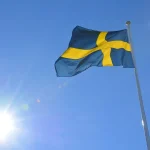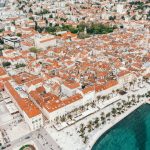The Swedish media has launched some scathing attacks on the Croatian Government and the current Croatian EU presidency, referencing the treatment of migrants, multiple failures to align with EU law and the dire demographic picture.
As Index/Slobodan Mufic writes on the 8th of February, 2020, Croatian Prime Minister Andrej Plenkovic and several of his ministers have repeatedly called on the Croatian media in recent weeks to pay less attention to disgraceful scandals caused by Croatian politicians and more attention to the presidency of the Council of the European Union.
Although each EU member state at some point or another assumes the six-month rotating presidency of the EU Council according to a pre-determined timetable, the Croatian prime minister presented Croatia’s EU presidency as some sort of remarkable success for his HDZ government and his diplomacy, and accordingly hoped for positive public recognition of that. The opposite happened.
For the most part, the Croatian media weren’t all that engulfed in writing about Croatia’s EU presidency, instead focusing on numerous political scandals. However, at the end of 2019, there was an increased interest in Croatian internal politics among the Swedish public.
A few weeks ago, the Croatian media reported criticism of Swedish MEP Malin Björk, who attacked Plenkovic at the plenary session of the European Parliament in Strasbourg following his presentation of the EU Council Presidency priorities, over the brutality of Croatian police against migrants and their forced return to neighbouring Bosnia and Herzegovina without following any of the proper administrative procedures.
“Don’t let Croatia enter Schengen”
Björk also set out her arguments and remarks in a column entitled “Do not allow Croatia to enter Schengen”, published on December the 31st, 2019, in the Swedish media outlet Svenska Dagbladet, traditionally inclined more to the right of the centre. In her text, Björk calls out Croatia over its poor treatment of migrants at the Bosnian-Herzegovinian border, and gives examples which she, as she says, has witnessed herself.
Her accusations of Croatia’s violation of EU regulations and international conventions are also referred to by a journalist for the same Swedish publication in a text titled “A bitter winter in refugee politics” about ten days ago. Writing about the EU member states’ disagreement on migration policy, Wiktor Nummelin points out: “Croatia is chest-thumping about taking care of its borders with police activities and not with the use of barbed wire, but instead of praise, it receives criticism because of the strict treatment of the border police.”
Although interest in Croatia in the Swedish media has intensified significantly in recent weeks, they began writing in a harsh and critical manner about Croatian politicians back in September, when Dubravka Suica was elected Vice-President of the European Commission for Democracy and Demography.
Then, in a column for the daily Aftonbladet, traditionally close to the Social Democrats, the former Minister of Culture, and today an MEP for the Greens, Alice Bah Kuhnke, wrote the following:
“It’s a worrying policy with the Commissioner who has spoken out against safe and legal abortions. Together with Hungary and Poland, Croatia has repeatedly argued that abortions should not be included in the protection of women’s sexual and reproductive health as an EU priority.”
She then urged her Swedish counterparts in the European Parliament not to vote for Dubravka Suica (HDZ).
The last arrow aimed at Croatia as chair of the EU Council appeared a few days ago in Svenska Dagbladet, and refers to the problematisation of INA’s sponsorship of the Croatian presidency of the EU Council, right at the moment when the EU is preparing the Green Plan, which foresees that the EU will become climate neutral by 2050.
“Croatia certainly expected to go unnoticed in choosing a relatively small national oil company to sponsor it, but this decision at the time of launching the Green agreement is scandalous. First of all, we don’t know what the companies are getting in return for their sponsorships. There must be some counter-service,” said Vicky Cann of the anti-lobbying Corporate Europe Observatory based in Brussels.
Emily O’Reilly, the European Ombudsman, thinks similarly. She told Svenska Dagbladet that “there is a risk that sponsors will have some influence over EU policy.” It should be noted that other members also had sponsors during their presidency of the EU Council, Sweden had Volvo and Telia, Ireland was sponsored by Audi, Romania was sponsored by Coca-Cola and Croatia’s predecessor, Finland, was sponsored by BMW.
“Aware of climate challenges, the Republic of Croatia strongly supports the ”Green Transition” and actively participates in discussions on major initiatives of the European Green Agreement. During the EU2020HR, Croatia will encourage discussions on the transition to a resource efficient, circular and low carbon economy for the sustainable use of resources and the achievement of climate neutrality by 2050,” reads the Ministry of Foreign and European Affairs’ response to criticism from the Swedish and other European media outlets.
“One smaller town disappears in Croatia every year”
In the meantime, the Swedish media outlet Svenska Dagbladet has published another text on Croatia, this time about Croatia’s demographic losses and emigration. The crux of the text, entitled “One smaller town disappears here every year” is that “Today, Croatia has almost 15 percent fewer inhabitants than it did in 1991”.
Also interesting is the quote by Minister of Science and Education Blazenka Divjak, who said that Croatia “still has schools for the industrial society of the 20th century”. To this, the author added: “She’s dreaming of brain circulation instead of the brain drain.”
As we can see, the Swedish media took the Croatian Government’s appeal seriously (although it was not addressed to them) and focused on Croatia’s EU Council presidency instead of politicians having magically appearing, undeclared houses and attacks on journalists, but it’s unlikely that Plenkovic and his government expected heavy criticism and valid complaints from the Northern European nation.
Make sure to follow our dedicated politics page for much more.











